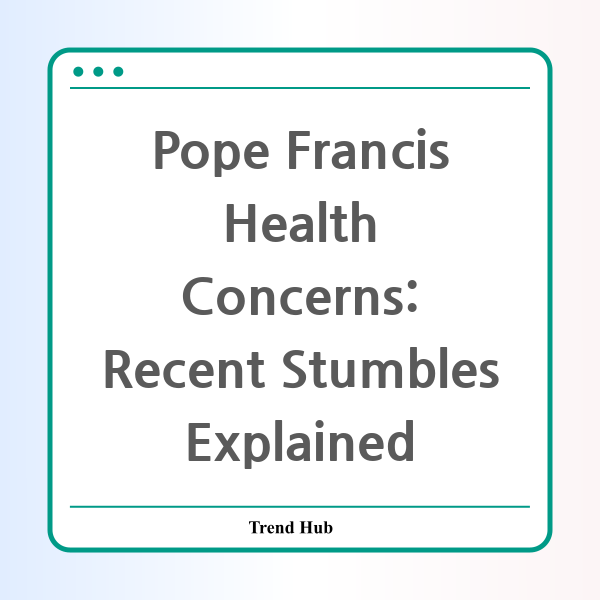* This website participates in the Amazon Affiliate Program and earns from qualifying purchases.

Pope Francis continues to capture the world's attention not only through his spiritual leadership but also due to the ongoing concerns about his health. Recently, an incident during a Jubilee audience at the Vatican has brought these concerns to the forefront. What happened, and what does it mean for the Pope's future?
On a recent Saturday, as Pope Francis entered the Vatican auditorium, he experienced a slight stumble when the handle of his walking stick snapped. The 88-year-old pontiff managed to regain his balance, demonstrating remarkable composure despite the incident. This minor slip, while alarming, did not lead to a more serious fall, thanks in part to the quick assistance of his aides who helped him to his chair. Following the stumble, a member of the audience shouted, “Viva il Papa,” prompting waves of applause and showing the crowd’s support.
Such episodes are not new for Francis, who has faced mobility challenges due to ongoing knee problems and arthritis. It’s well-documented that the Pope has used a cane and even a wheelchair during public appearances, marking a stark contrast to the robust image often associated with papal figures. Concerns about his health have been palpable, especially given that he has fallen on multiple occasions in recent months. In January, he experienced another fall that led to a precautionary arm sling, although thankfully, no fractures were reported. Furthermore, in December of last year, the Pope fell in his bedroom, sustaining a chin injury requiring stitches.
Given the historical context, the Pope's health has been a focal point of speculation since the resignation of his predecessor, Pope Benedict XVI, in 2013. Benedict's decision to step down was attributed, at least in part, to a fall that made him contemplate his ability to fulfill the demanding role of the papacy. While Francis acknowledges that Benedict opened the door to the possibility of resignation, he has reiterated that he has no intention of stepping down anytime soon, even after undergoing significant medical procedures, such as major intestinal surgery earlier this year.
In his recently published autobiography, "Hope," Francis affirms that he has not considered resignation in light of his health challenges. The Pope’s resilience and determination underscore a profound commitment to his role and mission, despite the physical limitations imposed by age and chronic health issues.
As we continue to witness these developments, one cannot help but reflect on the implications for the Catholic Church and its followers worldwide. The Pope’s occasional stumbling is not merely a health issue; it resonates deeply with the themes of vulnerability, resilience, and faith. His ability to engage with the public, even amid physical challenges, serves as a testament to his dedication and connection with believers around the globe.
In conclusion, the recent incident involving Pope Francis and his walking stick is a reminder of the human fragility that accompanies even the highest spiritual offices. While it raises questions about his ability to maintain the hectic schedule traditionally associated with the papacy, it also highlights the need for compassion and support for leaders facing such challenges. As he addresses his followers and continues his papal duties, Pope Francis exemplifies strength in vulnerability, fostering a spirit of hope and resilience that many find inspiring.
* This website participates in the Amazon Affiliate Program and earns from qualifying purchases.